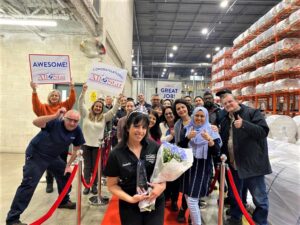
Haremar is fighting to fill the talent pipeline
Canadian Plastics
Canadian Plastics Human Resources Plastics ProcessesFaced with a labour shortage, this Vaughan, Ont.-based blown film coextruder is using a mix of hiring and retention strategies to staff up.

Vaidehi Kumar, Haremar’s human resources administrator, speaking to a prospective applicant at a job fair. Photo Credit: Haremar Plastic Manufacturing Ltd.
A boxer on the receiving end of a few one-two combos – a jab and the straight right hand – can have his lights turned out pretty quickly. For manufacturers, the one-two combo of a shortage of both skilled workers (which predated the COVID-19 pandemic) and unskilled workers (triggered by the pandemic and continuing to this day) can put a business out of business, literally turning out the lights for good.
The ongoing workforce crisis is the most pressing challenge facing manufacturers today, and plastics processing – which is technologically-driven but also labour-centric – can be particularly vulnerable. One shop, Vaughan, Ont.-based blown film coextruder Haremar Plastic Manufacturing Ltd., has opened up about its labour challenges and solutions, with human resources manager Amna Dawoud and human resources administrator Vaidehi Kumar saying that it takes a combination of approaches to win the recruitment fight.
“The shortage of skilled workers has been an ongoing issue,” Kumar said. “Despite a generous company benefits package, we struggle to find applicants who see themselves in manufacturing for the long term, particularly in production. The number of newer, skilled applicants entering the market has been slower than the rate at which the current workforce is retiring or remaining in the industry.” As of late-July 2023, Haremar is looking to fill about 10 operator positions, she added.
Founded in 1965 as a plastic film importer, Haremar eventually diversified into manufacturing its own polyethylene (PE) film products for printers, converters, and end users. In 2015, Haremar was acquired by film and sheet manufacturer Inteplast Group – along with El-En Packaging Co., a Vaughan-based sister company to Haremar that produces garbage bags – and today it processes PE film for specialty food packaging, shrink wrap, mail and security applications, and industrial and liquid packaging. Haremar currently employs about 135 workers, Kumar said, and runs 12-hour rotating continental shifts – a schedule that can be either a boon or a bane for attracting new workers. “Depending on the candidate, these hours may work well, but it isn’t for everyone,” she said.
Like most processors, Haremar is looking for workers with the right combination of skills and also a willingness to perform physical labour on occasion. “Since the positions we’re looking to fill are very niche, sector-specific roles, it’s been a challenge to find qualified and experienced candidates with related experience in blow molding extrusion,” Kumar said. “Sometimes, we do find promising applicants, both eager and willing to learn, but there’s still the skills gap that remains; and we find that people are shying away from roles that incorporate a lot of physical activity and labour.”
GETTING IT DONE
But Haremar isn’t short on ideas for luring new talent. The company makes the best use it can of internships and apprenticeships, for example. “While most of our roles are full-time, permanent roles, we’re open to internships and apprenticeships as a way of finding the right fit for our team in the longer term,” Dawoud said. “In fact, at present, we have a maintenance assistant intern currently in his second year, studying Mechanical Engineering at the University of Toronto, and he’s become a great asset.” Haremar has had interns from Toronto’s Seneca College in the past – including in its accounting department – and the company is looking to partner with Seneca again, and with other colleges and universities, on programs whereby new graduates can join the organization as a part of their co-op and get placed permanently after. “While there are very few colleges that offer plastics manufacturing-related training programs in Ontario, we’re willing to start at ground zero with local school districts to explore this opportunity,” Dawoud said.
A second recruitment strategy involves community outreach. “We’ve been partnering up with the York Region Food Bank every Thanksgiving for the past few years to help them with their food drive initiatives, and we recently partnered with YMCA – Markham Region to fill out open roles and give an equal opportunity to the newcomers enrolling at YMCA as well as the influx of Ukrainian refugees looking for work,” Dawoud said. “We’ve met a lot of promising applicants, eager to learn more in the plastics industry, and we’re eventually going to branch out to different locations in attempts to reach diverse neighbourhoods and demographics.” Haremar also attends local job fairs, she added.

Danielle Cruz, a Haremar operations lead, is honoured as an All-Star in the company recognition program. Photo Credit: Haremar Plastic Manufacturing Ltd.
Third, during the interview stage, honesty with an applicant remains the best policy for hiring and then avoiding absenteeism. “We’re located in an industrial area with very limited access to transit, which means that workers without access to a car or a reliable means to commute to work may struggle to make it on time – or to make it at all, in some cases,” Dawoud said. “We’re upfront about it and have candid conversations about transportation with our applicants to figure out how to accommodate them schedule-wise.”
Fourth, Haremar undertakes a number of workforce development practices to lure – and keep – new talent, including tuition reimbursement up to 75 per cent as well as professional and career development to hone skills that are consistent with their job responsibilities, in-house training programs, a good benefits package, and paid time off. There are also employee recognition programs, including the “All-Stars Recognition Program” at the corporate level, and monthly employee recognition and an Employee of the Year programs at the local level.
In the end, access to a large, high-quality workforce is critical to manufacturing success – it boosts a company’s output, productivity, and profitability, and also allows it to take the fullest advantage of new technologies and production methods. The alternative is a persistent, chronic staffing shortage that leads to lost sales, penalties for late delivery, and even business failure. And in the bigger picture, labour shortages will also limit the entire sector’s future growth prospects.
Along with almost all shops, Haremar is definitely being hit. But it’s also fighting back with some counterpunches of its own.
